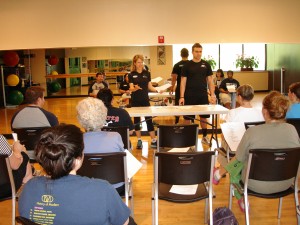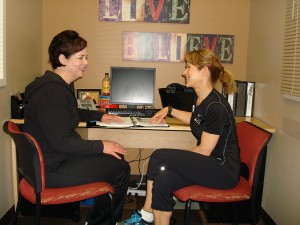 The human body is a machine and it requires proper training, conditioning and nutrition to run at its fullest potential. Unfortunately, your members may be unaware of the key role nutrition plays in the proper functioning of their body, impeding their fitness goals in the process.
The human body is a machine and it requires proper training, conditioning and nutrition to run at its fullest potential. Unfortunately, your members may be unaware of the key role nutrition plays in the proper functioning of their body, impeding their fitness goals in the process.
“The body is created in the kitchen, sculpted in the gym and perfected with the trainer,” said Dwayne Turner, the fitness director at City Fitness in Philadelphia, Pa. “As we get more and more in tune with the human body and how it works and how it functions, we are finding out that the key to weight control, weight loss, muscle gain and fat reduction is the way of nutrition.” As a club, it’s your job to educate your members on how to properly fuel their bodies — to get the human body running like clockwork.
Programs and Education
Health and fitness comes from a combination of nutrition and exercise. Clubs that don’t offer nutritional guidance to members might deal with latent frustration later down the road. “When it comes to health, nutrition is such a huge factor,” said Kim Flannery, the nutrition director for the Wisconsin Athletic Club (WAC). “You want to keep your members, and nutrition is a big part of that. Without that piece, it’s often very frustrating — and frustration is not very good for keeping members.”
To alleviate members’ nutrition frustrations, WAC hired Flannery as an in-house dietitian to educate members. Flannery provides members with nutritional information during seminars that are free to members and non-members, through cooking classes, weight-loss groups and fee-based programs, such as “The Body Budget Program.”
The Body Budget Program emphasizes personal choices and lifestyle changes for sustainable weight loss, said Flannery. Members participate in weekly weigh-ins and are given the basic tools to change their habits. “I think it’s important to know your membership, and for clubs to realize that weight loss is something members will probably want and need.”
WAC drives members to its nutrition programs and seminars through a free assessment that is given to all new members. Each member goes through a new member orientation meeting and is encouraged to pick two free classes (such as nutrition) to take in order to make an easy transition into the club. “The new member orientation meetings — I definitely get clients out of those. I’ll do the complimentary appointments and oftentimes they’ll sign up for something more,” said Flannery.

Offering members a free assessment is a great way to introduce members to your nutrition program(s). In turn, by offering nutritional advice you’ll be making sure your members are meeting their goals and getting the most out of their membership. “The free classes are a good way to expose people to other programs too,” said Flannery. “Trying to partner nutrition programs with personal training — when you package training appointments with nutrition appointments, then they also get a little lead into the nutrition area. Creative packaging is good.”
Treehouse Athletic Club in Draper, Utah, implements a similar nutrition program, through an online meal-planning program. Melissa Garcia, the nutritionist at Treehouse, offers members a four, or eight-week program to follow and works with members to cater to their specific dietary needs. “Right now most of my clients are for weight loss,” said Garcia. “Some just want to be healthier, some have health issues such as high cholesterol or hypertension — but the bulk of my clients are for weight loss.”
The first week of the program, Garcia discusses her clients’ goals, their schedule, stress level, food preferences and puts together a meal plan specially tailored to the member, which they access online. The goal of the program is to enact a lifestyle change, not a quick fix. “Many of my clients tell me — this doesn’t feel like a diet. I could do this for the rest of my life,” she said. “The point of the program is for lasting change — for them to be consistently making smarter choices.”
Although most of Garcia’s clients are currently using her services to lose weight, she encouraged clubs to offer a multitude of different programs to members. “I think it’s a good idea to have different types of approaches. Not everyone is looking for the same thing. Offer sports-related training advice, pre-diabetic nutrition — there are so many ways nutrition plays into our fitness and health, it’s not just for weight loss. We try to adjust the program accordingly.
“[Nutrition] is definitely important. Exercise is just half of it. Sometimes people look at one and not the other, and often nutrition is overlooked. They go hand in hand. As part of the health club industry, clubs have to have an obligation to provide some sort of help in terms of nutrition.”
Vendor Partnerships
For smaller clubs, having an in-house dietitian or nutritionist may not be realistic. Shannon Sorrels, the owner of Physix in Phoenix, Ariz. uses dotFIT as a partner to cater to members’ nutritional needs. “DotFIT is our nutrition program. They are one of the legs of our table — without them, we’d fall over. How many small fitness companies can say they have RDs, PhDs, former fitness competitors, a web development team and a whole supplement supply-chain standing right behind them? Thanks to dotFIT, we can,” said Sorrels.
DotFIT provides Sorrels with sample menu plans, calorie recommendations and articles and videos that explain the mechanics of the human body on a specific, tailored diet. “Their content and resources save us time,” said Sorrels. “They aren’t just our supplements manufacturer or a way to earn a little extra revenue on some protein bar sales, dotFIT helps us incorporate what clients are eating and drinking into our whole program.”
Members at Physix are treated to nutritional advice as part of their membership. “We include it in their program. Period. We do not nickel and dime them for every little extra service. We treat our clients like we’d want to be treated, and that means doing as much as we can to help them achieve their fitness goals, including nutrition. Without it, we know the chances of them reaching their goals are nil, and if they don’t reach their goals, they won’t be happy customers.”
Josh Harwood, the senior vice president of operations for Titan Fitness, partners with Supplement Rx, a supplement manufacturer. Supplement Rx gives Titan Fitness access to web-based tools that will help them discern what exactly a member might need, whether they’d like to tone up or lose weight, said Harwood.
“The supplementation is profitable to us in two ways. First, by meeting our most common members’ needs with high quality products exclusive to health clubs we are continuing to build trust with our members and enabling them to achieve their goals. Second, of course, is through the margin we make on the supplements,” explained Harwood.

In the end, Supplement Rx has helped Titan Fitness’ bottom line, while also meeting members’ nutritional wants and needs. “There is a market for these services. Whether it is prepared foods, supplementation or nutritional counseling, the buying volume of Americans in these areas represents billions of dollars annually,” said Harwood.
“We already know these solutions can help solve the physiological or behavioral issues leading to de-conditioning, but now this data shows us that the consumer not only knows this, but will spend money on it. Thus it represents a win-win opportunity for us as health clubs to offer these services.”
Juice bars or small cafés may be a great way to sell products, and an added profit center to your club. City Fitness collaborated with Performance Food Centers to offer members smoothies, protein shakes, bars and other foods to brand its club as not only a fitness center, but also as a health center.
“They bring value to our clubs because people understand that it’s okay to eat and that the body wants to be fed,” said Turner. “At the location located on Spring Garden Street, men and women stop in before work, for lunch, on their way home from work, just to come in for a meal replacement, protein or a smoothie.
“We have created a culture at our juice bar where our members are seeing the value of replenishing the muscles after a hard workout or ingesting the correct macro-nutrients early in the morning to increase their energy levels. We have had non-members walk in just for a shake and end up buying a membership based on the juice bar and what it brings to the club.”
Explore different options. Does your club specialize in personal training? The American Council on Exercise offers a nutrition and weight management course bundle that will teach trainers how to advise members specifically on nutrition. Does your club have a nutrition program? If so, reach out to corporations — many companies would love to give employees additional wellness options. If you don’t have a nutrition program, partner with a vendor. Nutrition options and education will not only benefit your members, but your club’s value as well.
Ultimately, nutritional advice is not just something members want — it’s oftentimes something they need. Use the knowledge you’ve garnered from being an expert in the health and fitness industry to empower and educate your members. By providing members with nutritional advice and options, you’ll place them on the correct path to reaching their goals — and get their bodies functioning as a well-oiled machine.
By Rachel Zabonick








